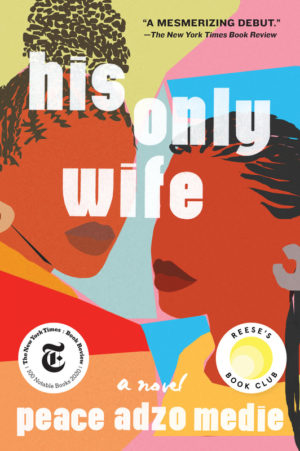You have no items in your cart. Want to get some nice things?
Go shopping
An intriguing and thought-provoking sentence opens the novel His Only Wife by Peace Adzo Medie and demands an undivided reader’s attention. “Elikem married me in absentia; he did not come to our wedding,” the young Afi Tekple narrates her story. “The ceremony was held on the third Saturday in January in the rectangular courtyard” of Afi’s uncle’s house. The two families gathered to execute an arranged and forced marital union that would bind the young couple to an equally rectangular life within the strict and absurd confines of their community. Afi’s uncle, the head of the Tekple family, saw significant financial relief in the wealth and kindness of Elikem Ganyo, a successful young businessman from the country’s capital. Elikem’s mother, the head of the Ganyo family, despised the Liberian woman her son had chosen and with whom he has already had a child. She hoped that Afi’s youth and modesty, as well as her lack of support and education, could come in handy in luring his son out of “that woman’s” embrace. The couple was forcefully and absurdly united, after which Afi was sent to live alone in the groom’s spare condo in Accra, awaiting the stranger husband’s infrequent and unexpected visits.
In this fast-paced confessional story that in essence follows the structure of a romance, Peace Adzo Medie quickly and unapologetically penetrates the troubled soul of the corrupt modern-day Ghanaian society. Issues that Adzo Medie unearths right from the start of the novel reach beyond the contemporary feminist narrative and the concept of equality.
In His Only Wife, we meet men who are defending their societal right to live with more than one wife and women who are feeding to the men’s power by teaching their daughters to play by the rules no one is still allowed to question.
We encounter a world in which older women, mothers and aunts, are not setting the example but gatekeeping a system in which their daughters grow into dutiful leaches that exist only to, through the right marriage, provide a good living for the entire family. The sons, equally deceived and used as mere providers, remain unaware of their right to experience love and to fight for a woman of their choosing. Even accomplished sons like Eli Ganyo are still mute in front of the women who raised them. Their biggest concern seems to be keeping the older adults satisfied and the community free of gossip.
The sentence, “All men are the same, they only know how to love themselves and to sit on women,” resurfaces resentment. Are those societal rules a cursed wheel that can’t stop? Or can there be someone at the right moment who would dare raise a question? What if I don’t want to answer to the mothers? What if I want to fight for a man I’ve fallen in love with? Afi Tekple challenges the social norms as she decides to fight for a life she imagined, a life where she would be his only wife, loved and respected. She understands that “marriage shouldn’t be a never-ending competition where you spend your life fighting to be seen and chosen.” However, society fights back with their seemingly reasonable and realistic explanations. Different voices come forward and blend into a harmonious chorus, preaching:
Afi, look around you, look at the life you have. A beautiful flat, a car and driver parked in front of the building; you even said he’s promised you a boutique in the new mall. On top of that he’s kind and loving. So what if he sometimes goes to stay with another woman? Men have side-babes, that’s just the way it is. But it doesn’t matter because you are his wife. You are the one his family and friends recognize, and that’s what’s important.
The narrative structure, characterisation, and the language that Peace Adzo Medie employed to write the story turned out simpler than I had expected, considering the theme’s complexity. Still, I kept turning the pages in urgency as if my continuous presence in the story would help save the heroine. Afi Tekple shone throughout the story with her honesty, defiance, and loving heart. She proved that even inside a rotten society, one could remain uncorrupted. For the story is told through Afi’s eyes, Eli’s character did not come fully alive, but his heartache came through as overwhelming. The dualism consumed him: his honest love for his first wife that nobody approved is now opposed to his new and growing sentiments towards Afi.
Peace Adzo Medie dared write about the world in which new generations of men and women are equally victimized and doomed to emotionally empty lives to keep the old world’s definition of marriage and coupling alive. Marriage in such society is the unbreakable financial agreement between two families, made to answer to the needs of the tribe. Afi Tekple dared write an alternative ending.
By Alexandra Panic





